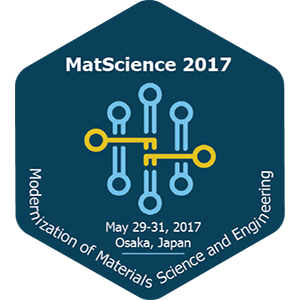
Chia-Jyi Liu
National Changhua University of Education, Changhua, Taiwan
Title: Energy-saving fabrication of Ag2Te-Te and Co1-x-yNixFey thermoelectric materials
Biography
Biography: Chia-Jyi Liu
Abstract
Thermoelectric materials can be used to generate electricity from waste heat via the Seebeck effect. High-energy input is often required to fabricate thermoelectric materials. In this talk, we present a green route to synthesize Ag2Te-Ag nanocomposites with the reaction taking place in one pot at room temperature without any organic substance involved. Various amounts of silver in the Ag2Te-Ag nanocomposite can be obtained depending on the reaction period of time. A possible mechanism is presented for the formaiton of Ag2Te-Ag nanocomposite. A core-shell structure at the incipient stage of Ag2Te growth can be observed. However, the reaction duriation has a significant effect on the electrical transport behavior of the nanocomposites due to presence of various amounts of Ag, which might be beneficial for enhancing the performance of thermoelectric composites.
We also present a rapid route for fabricating co-doped Co1-x-yNixFeySb3 using hydrothermal methods. Hydrothermal synthesis was carried out at 170°C for a duration of 12 h, followed by evacuated-and-encapsulated heating at 580°C for a short period of 5 h. The resulting samples are characterized using powder x-ray diffraction, density, electronic and thermal transport measurements. Due to the bipolar effects on thermopower are shifted to higher temperatures as compared with the nondoped CoSb3, the power factor of Co1-x-yNixFeySb3 is significantly enhanced in the high temperature region due to significant enhancement of the electrical conductivity and absolute value of thermopower. The thermal conductivity of Co0.76Ni0.14Fe0.10Sb3 decreases with temperature down to 1.02 Wm-1K-1 at 600 K. As a result, the largest zT of 0.68 is attained for Co0.76Ni0.14Fe0.10Sb3 at 600 K. We also analyze the lattice thermal conductivity to gain insight into the contribution of various scattering processes that suppress the heat transfer through the phonons in Co1-x-yNixFeySb3.

